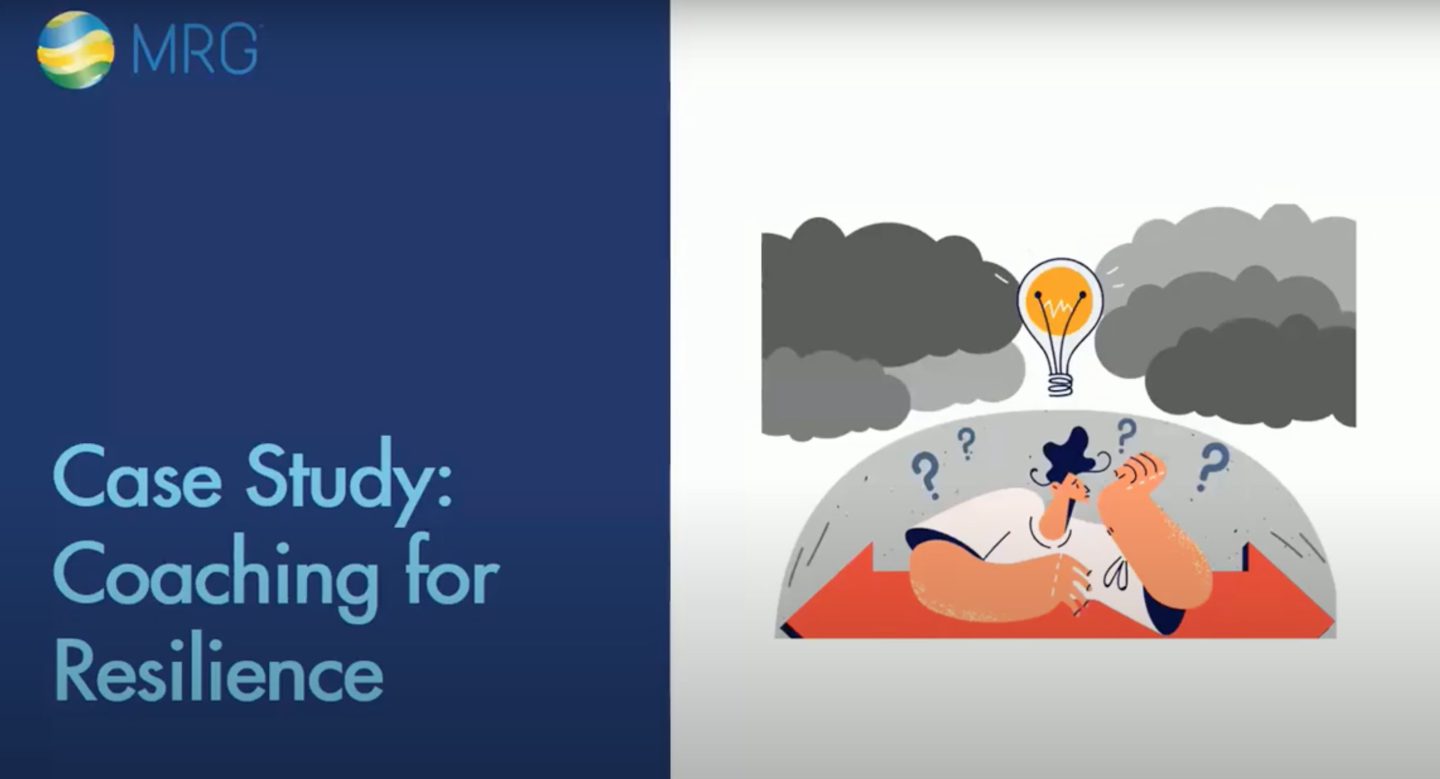Coaching for Resilience: A Real-World Case Study

In an era of rapid change, global competition, and evolving workforce expectations, resilience isn’t a nice-to-have — it’s a must-have. At MRG, we define resilience not simply as sticking with something, but as the capacity to adapt, recover, and grow stronger in response to challenge. This webinar excerpt explores how coaching for resilience can shift mindset and behavior, helping individuals, teams, and organizations to thrive rather than just survive.
Why Coaching for Resilience Matters
When leaders and teams face disruptions—whether from market shifts, technological change, mergers, or internal culture issues—their ability to respond effectively determines not only team morale, but business outcomes. Coaching for resilience builds the foundation for sustained performance by enhancing self-awareness, restoring balance, and equipping people with the tools to bounce back and lead through change.
As Tricia Naddaff puts it during the above video clip:
“Resilience isn’t about returning to where you were. It’s about reaching forward from where you are, with greater clarity and strength.”
This reflects the core of our unique approach: Coaching for resilience isn’t a pit stop—it’s a continuous journey of growth anchored by insight and action.
Four Pillars of Coaching for Resilience
In the webinar excerpt above, we demonstrate a case study where a telecommunications company used MRG’s assessments and coaching framework to rebuild team resilience following a major restructure. The process centered on four foundational pillars:
1. Self-awareness & mindset reset
Resilience begins with understanding how individuals respond under pressure, what drives them, and where their blind spots lie. Our assessments help reveal habitual reactions and motivations, opening the door to intentional change.
2. Behavior adaptation and agility
Resilient teams don’t just recover—they adapt. Through coaching, participants test new behaviors, learn how to shift their approach in different situations, and build confidence in their flexibility. The session demonstrates how tools like the LEA™ and IDI™ help facilitate this work.
3. Systems of support and accountability
Coaching for resilience is enhanced significantly by structures that embed new habits. In the case study, we show how the organization implemented tracking systems, peer-coaching clusters, and follow-up sessions to prevent regression and sustain forward momentum.
4. Performance linkage
Ultimately, coaching for resilience translates into measurable business impact. In this case study, the client measured improved team engagement, fewer derailments, stronger retention, and faster recovery post-change. That’s coaching for resilience that shows up in performance, not just sentiment.
How We Apply the Concept at MRG
At MRG, we believe resilience coaching works best when grounded in data and design. Our core assessments—Leadership Effectiveness Analysis™ (LEA) and Individual Directions Inventory™ (IDI)—are built to surface actionable insight about behavior and motivation. They enable coaches and HR professionals to:
- Diagnose resilience readiness: Understand who is vulnerable, who is coping, and who is thriving.
- Craft targeted coaching interventions: Tailor conversations and plans based on individual and team insights.
- Embed feedback loops: Use reporting and dashboards to monitor progress, identify setbacks early, and reinforce positive change.
- Link coaching to strategic outcomes: Connect resilience-building to retention, performance sustainability, culture adaptability, and leadership pipeline strength.
Through this lens, MRG shifts the conversation from “Can we survive this change?” to “How will we lead through and beyond it?”
Why Use the Term Coaching for Resilience
Using the phrase “coaching for resilience” explicitly shifts attention from general leadership development to a focused, outcome-oriented intervention. It helps organizations:
- Frame coaching as a strategic tool, not just a nice perk.
- Signal to participants and stakeholders that the work is about adaptation, recovery, and growth.
- Differentiate coaching initiatives that drive real-world results from those that remain generic and disconnected.
Final Thoughts
Coaching for resilience isn’t a one-off program—it’s an embedded capability. Organizations that invest in resilience coaching with clarity, structure, and measurement gain more than just “bounce-back” ability—they gain ongoing adaptability, a resilient leadership culture, and sustained performance.
With MRG’s assessment-driven methodology and case-study approach, you’ll not only see how to coach for resilience, you’ll see how to build it, embed it, and measure it. Watch the webinar excerpt above to explore how this works in action, and discover how you can bring this type of coaching into your leadership development strategy.